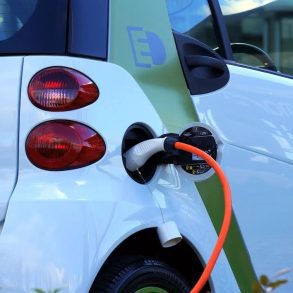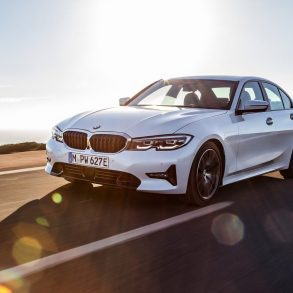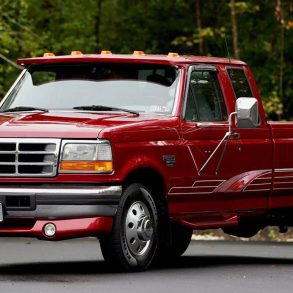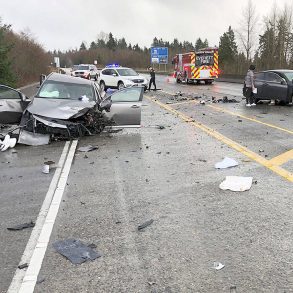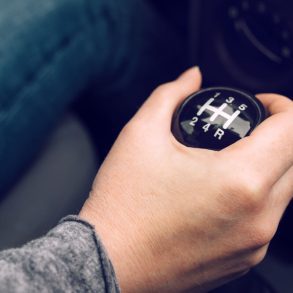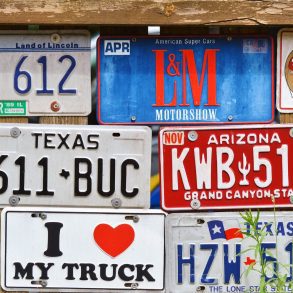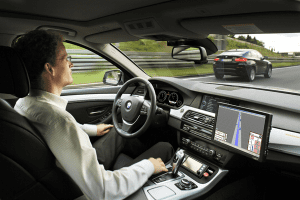
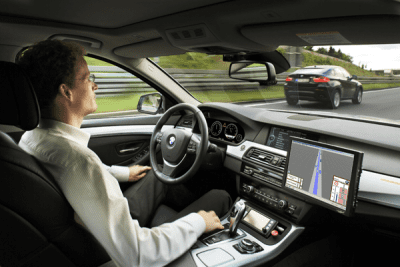 There are many roads that are just too much fun not to drive yourself.
There are many roads that are just too much fun not to drive yourself.
At first, I was skeptical of self-driving cars as well, because autonomous cars would take the fun out of driving. I might as well take the bus or train, if I can’t have control over my own steering wheel and throttle. I don’t have a rear-wheel drive roadster and a V6 Alfa Romeo just to sit back and let the car have all the fun, I want to enjoy every kilometer I drive.
Not everyone drives the Nürburgring on their daily commute
But in reality, I wasn’t enjoying every kilometer. Sure, there are many moments on secondary roads where I get my kicks out of some challenging corners or even roundabouts, or feeling that push in my back when I hit the throttle. But the majority of my commute on the highway is just numbingly following the car ahead of me who’s driving 2 km/h slower than I would like him to, but I can’t be bothered to overtake it. And that’s also due to the fact there might be a traffic cop hiding behind the bushes, ready to preach about road safety, and charging a hefty lecture fee as well.
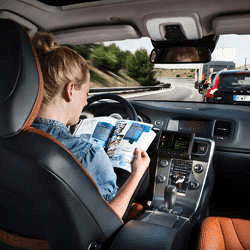 And people like me are becoming extinct. Most people currently in their twenties and early thirties care more about their smart phones and texting than they care about cars and driving them. Most can hardly withstand the tendency to read or send an sms/WhatsApp-message or to check their e-mails while driving a car at lethal speeds.
And people like me are becoming extinct. Most people currently in their twenties and early thirties care more about their smart phones and texting than they care about cars and driving them. Most can hardly withstand the tendency to read or send an sms/WhatsApp-message or to check their e-mails while driving a car at lethal speeds.
The benefits of self-driving cars
Just imagine if you could just set your GPS to the desired address, and let the car do the driving. Go to sleep and wake up when you’re almost there. No more worrying how you’re going to fit your work, your family and your social life into a 16-hour daily schedule, because you can work or socialize from the driver’s seat. No more messing with the clutch or brakes in stop-and-go traffic. No more stress and anger towards other drivers, like comedian George Carlin said: “Everybody who drives slower than you is an IDIOT! and everybody who drives faster than you is a MANIAC!”.
And think of the benefits of getting the flawed and prejudiced human decision making off public roads. No more trying to fill that gap in front of the other car just to feel like you’re biggest rooster in the hen house, no more traffic accidents from people misjudging another car’s speed or distance or reacting too slowly to a change in road or traffic condition. Computers are never in a hurry or stressed, and will certainly not take risks. Don’t we all know someone of whom we think the road would be a safer place without them behind a steering wheel? Regardless of whether it’s because of overconfidence or underconfidence. And let’s just be politically incorrect and admit we would like to see elderly people off the roads as soon as possible. Thank you old timers, for giving us the world as you have helped it become, we’re taking care of it now. So give us the roads as well, we’ll take care of that too. You just can’t keep up anymore, your reaction times are too slow to keep up and you have no clue what’s going on.
With those who don’t care about driving and those who may react unpredictably taken care of by self-driving cars, the roads should belong to the petrolheads again.

The concerns with self-driving cars
 Still, I am not yet decided on fully automated driving, as you may conclude from my sarcastic “not-the-news” article on autonomous cars, as a computer can only follow algorithms and, it cannot replicate human intuition, for example to expect a child following when a ball comes bouncing from between parked cars. Every possible unexpected traffic situation has to be expected and pre-programmed into the vehicle’s computers and then the computers still need to recognize the situation and assess it correctly, within microseconds. For highway driving, that shouldn’t be too complicated. In fact, with Adaptive Cruise Control, Blind Spot Warning Systems and Lane Keeping Assistants, self-driving cars are already somewhat of a reality on highways.
Still, I am not yet decided on fully automated driving, as you may conclude from my sarcastic “not-the-news” article on autonomous cars, as a computer can only follow algorithms and, it cannot replicate human intuition, for example to expect a child following when a ball comes bouncing from between parked cars. Every possible unexpected traffic situation has to be expected and pre-programmed into the vehicle’s computers and then the computers still need to recognize the situation and assess it correctly, within microseconds. For highway driving, that shouldn’t be too complicated. In fact, with Adaptive Cruise Control, Blind Spot Warning Systems and Lane Keeping Assistants, self-driving cars are already somewhat of a reality on highways.
But city traffic is much more complicated, with traffic coming from all possible directions, bicycles, pedestrians, busier streets etc. making it virtually impossible for computers to be programmed to respond quickly and correctly in 100% of the situations. Because that is the margin of error that we should allow for an appliance that could easily kill a child crossing the road. Would it be realistic to expect a margin of error from software that depends on input from a computer geek in a warehouse in some industrial zone, far away from reality and hardware that’s made by the lowest-price bidder in a country where child-labor is still very much commonplace?
Autonomous cars communicating with each other in order to prevent accidents or even traffic delays will only work if all traffic is automated, that means every car, bicycle, pedestrian, child or even animal. Because one unpredictable factor in the equation will mess up the calculations.
The future of self-driving cars
The way I see it, autonomous cars are a viable solution for highway traffic, regardless whether at cruising speed or stop-and-go congested highways. The driver can drive the car from his home to the on-ramp, where he/she can push the Autopilot button and the car will take over control, maintaining a safe distance from other vehicles and adjust the speed accordingly, while the driver can take a nap, read the news or do some homework. Then, when the pre-chosen exit comes up, the car will warn the driver, and will steer towards the off-ramp, where either the driver can take back control or the car will come to a safe stop.
For non-highway traffic, some of the sub-technologies that are developed for autonomous driving can be used to assist and warn human drivers, but I don’t believe they should ever take full control over a vehicle, as there’s just too much complexity and risk involved. Sure, humans are imperfect as well, but at least a human can be held responsible for his actions and decisions. If a self-driving car causes an accident with another car, do we blame the programmer who gave the wrong data-input, or should we automatically assume the other driver must have messed up?
But maybe I’m just holding on to a thing from the past for nostalgia reasons, becoming one of those people who say that things were so much better “in the old days”, like those who thought the internet would be just a craze and nobody would buy smartphones. If you had asked people at the end of the 19th century what they would like for future transportation, they would have said: “we’d like a faster horse”. What if Karl Benz had listened to them and decided that a faster horse was the way of the future instead of a 4-wheeled motorized chariot?
The future needs visionaries, but the present is full of doubters and people who object to any kind of change.
Also read: The next step after self-driving cars: passengerless cars

